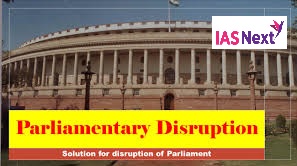CURRENT AFFAIRS
Get the most updated and recent current affair content on Padhaikaro.com
Disruptions in Parliament
- IAS NEXT, Lucknow
- 31, Jan 2022

Reference News:-
The Supreme Court in its recent judgment has observed that:
- A nation aspiring to be a “world leader” should debate on the welfare of its citizens rather than make Parliament a stage to exchange jeers and launch personal attacks on one another.
- With the completion of 75 years of Independence and ambitions of becoming a world leader, elected members should at least know that they are expected to show statesmanship and not brinkmanship in the House.
- Legislature is the first place where justice is dispensed to the common man through a democratic process.
Background:
The order dealt with the year-long suspension of 12 BJP MLAs from the Maharashtra Legislative Assembly for disorderly conduct.
How often are Disruptions in Parliament?
Disruption is replacing discussion as the foundation of our legislative functioning.
- A PRS (PRS Legislative Research) report says during the 15th Lok Sabha (2009-14), frequent disruptions of Parliamentary proceedings have resulted in the Lok Sabha working for 61% and Rajya Sabha for 66% of its scheduled time.
- Another PRS report said, the 16th Lok Sabha (2014-19) lost 16% of its scheduled time to disruptions, better than the 15th Lok Sabha (37%), but worse than the 14th Lok Sabha (13%).
- The Rajya Sabha lost 36% of its scheduled time. In the 15th and 14th Lok Sabhas, it had lost 32% and 14% of its scheduled time respectively.
Reasons for Disruption:
- Discussion on Matters of Controversy and Public Importance.
- Disruptions May Help Ruling Party Evade Responsibility.
- Lack of Dedicated Time for Unlisted Discussion.
- Scarce Resort to Disciplinary Powers.
- Party Politics.
What needs to be done?
- To curb disorder in Parliament there is a need for strict enforcement of code of conduct for MPs and MLAs.
- The Chairperson should suspend MPs not following such codes and obstructing the Houses’ business.
- The government of the day needs to be more democratic and allow the opposition to put their ideas in free manner.
- A “Productivity Meter” could be created which would take into consideration the number of hours that were wasted on disruptions and adjournments and monitor the productivity of the day-to-day working of both Houses of Parliament.